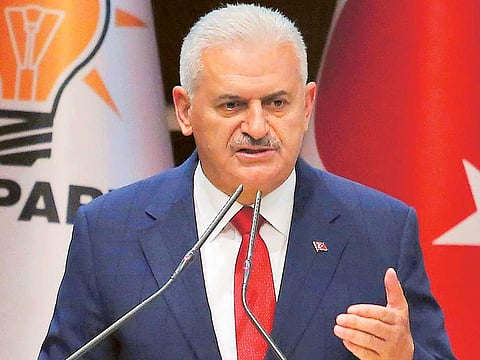Kurdish threat may have pushed Ankara to normalise ties with Damascus
Secret meeting held between Turkish and Syrian officials recently, according to reports

Dubai: Turkey’s announcement of its push to develop relations with Syria is a message to the regional powers that Ankara is willing to discuss pending issues related to the 5-year-old war in its southern neighbour, analysts say.
On Wednesday, Turkish Prime Minister Binali Yildirim announced in a television address that restoring relations with Syria was needed both in the context of a counter-terrorism campaign and an overall reset of relations with regional powers.
“I am sure that we will return [our] ties with Syria to normal,” he said. “We need it. We normalised our relations with Israel and Russia. I’m sure we will go back to normal relations with Syria as well... This is inevitable.”
The statement may point to Ankara’s shifting policy due to the common threat of a Kurdish insurgency that it shares with Damascus, as well as the threat both face from the Daesh terror group.
Those shared concerns were brought up in secret talks held between Turkish and Syrian officials recently, according to a report in Foreign Policy – a bimonthly American magazine.
Syrian President “Bashar Al Assad told us that the PYD (Syrian Kurdish Democratic Union) is a traitor organisation,” said Dogu Perinecek, a Turkish socialist politician, who held talks with Syrian officials, the report said. Esmail Hakki Pekin, the former head of the Turkish Armed Forces Military intelligence also took part in the alleged secret talks.
The Turkish Kurdistan Workers Party (PKK) is also fighting the Turkish government and has claimed responsibility for some of the recent bloody attacks in Turkey.
According to the article, senior officials at the Turkish foreign ministry confirmed meeting Pekin recently but denied that Turkey was negotiating with the Syrian regime.
Ankara-based analyst Ali Bakeer however played down the role of the Kurdish threat in Turkey’s apparently changing position on Syria.
Yildirim’s “aims to create a positive atmosphere after mending relations with both Russia and Israel”, said Bakeer.
His statements also “aim to send a message to the regional players, and not the Syrian government, that ending the Syrian war is in Turkey’s benefit”, Bakeer told Gulf News. “Turkey is open to renegotiating the issues that were in the way of reaching an agreement,” he added, citing Al Assad’s fate as one of those issues.
Ankara has repeatedly said in the past that the only solution to the Syrian crisis and regional security is through Al Assad’s ouster. Turkish President Recep Tayyip Erdogan was quoted recently as saying that Al Assad is much more dangerous than Daesh.
Yusri Azbawi, a researcher in Syrian affairs at the Cairo-based Al Ahram Strategic Studies Centre said that Yildrim’s statement reflects a major shift in Turkish policy vis-a-vis Syria, coming as a result of several factors.
“First, [Russian President Vladimir] Putin’s regime has a very influential role in Syria and is supporting Al Assad’s regime. Secondly, Russia is attempting to fill the gap resulting from the failure of the American policy in the region,” he said.
“It is clear that there are a sort of regional arrangements” to solve the Syrian crisis,” Azbawi concluded.
Turkish statements might also be a “tactical move” necessitated by the regional and international developments, Azbawi said.
Late last month, Turkey ended its six-year-diplomatic standoff with Israel since Israeli commandos shot dead nine Turkish activists travelling on an aid flotilla making for the Gaza coast in 2010. At the same time, Ankara also offered an apology to Russia over the downing of a Russian fighter jet.
Abdul Kadir Selvi, a veteran journalist with the Turkish daily Hurriyet, told Foreign Policy that in the current “era of realism”, the Turkish government will continue to criticise the Syrian regime, but also expend less effort to topple Al Assad and cooperate with actors who want to prevent the establishment of a Kurdish corridor in northern Syria.
“The territorial integrity of Syria is now more important for the Turkish state than the fate of the Al Assad regime,” Selvi said.


